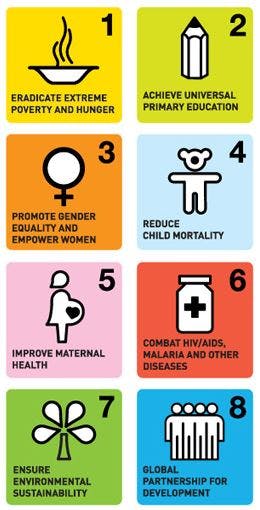By Raki Wane, UN Foundation Intern
This week, we’re continuing our “MDG Mondays” series on the blog. The Millennium Development Goals (MDGs) provide a global blueprint for the international community to focus its efforts to improve lives. As we approach the December 31, 2015 target date for the goals, we’re reflecting on the strides we’ve made and what still needs to be done.
About the Goals
This week, we’re highlighting goals 2 and 3, which target education and gender equity, respectively.
Goal 2: Achieve Universal Primary Education
- Target 2.A: Ensure that, by 2015, children everywhere, boys and girls alike, will be able to complete a full course of primary schooling
Goal 3: Promote Gender Equality and Empower Women
- Target 3.A: Eliminate gender disparity in primary and secondary education, preferably by 2005, and in all levels of education no later than 2015
How are we doing?
- By 2010, 90% of children in developing regions were enrolled in primary education, in comparison to 82% in 1999. That said, most of the gains were made by 2007 and have somewhat stagnated since. In 2012, 58 million children of primary school age were out of school.
- We’ve also made progress in opening the doors to education to more girls. All developing regions in the world have achieved, or are close to achieving, gender parity in primary education. Yet girls still face disadvantages in many countries, and disparities persist in secondary education.
- Women’s political participation is on the rise too. As of January 2014, 46 countries can claim that more than 30% of their members of parliament in at least one chamber are women.
According to the UN, many challenges remain. For example, women are more likely to work in vulnerable or undervalued jobs, violence against women continues to undermine the efforts to reach all of the MDGs, and poverty stands in the way of secondary education for many, especially adolescent girls. Worldwide, 781 million adults and 126 youths still lack basic literacy, over 60% of whom are women.
Yet, as we’ve seen in many communities around the world, progress is happening. As we look to the next 500 days and beyond, one of the best investments we can make is educating girls. This has a positive ripple effect: Educated and empowered girls can earn higher incomes, have healthier families, and help break the cycle of poverty.
Visit our Girl Up campaign to learn more about supporting the UN’s work to empower girls. As education advocate and inspiration teen Malala Yousafzai recently wrote, “The road to education, peace and equality is long, but we will succeed if we walk it together.”



 View All Blog Posts
View All Blog Posts